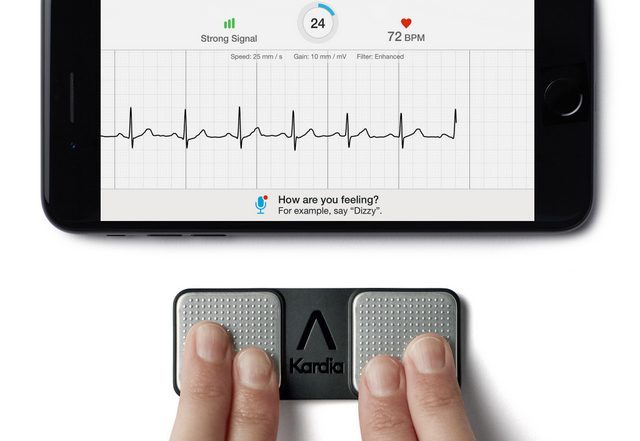Spotlighting three medical innovations to aid physicians and patients.
These three medical innovations were featured at InnovatED, an interactive demonstration of new healthcare technology at ACEP17. ACEP18’s InnovatED will feature a Pitch Event hosted by AngelMD. To learn more about this event, or to enter your company into the competition, go to info.angelmd.co/acep.
Alive Cor Kardia: Smartphone-based EKGs
AliveCor’s Kardia gives patients two ways to check a rhythm strip. By placing their fingers on sensors connected to a smartphone, they can record an FDA-cleared, medical-grade EKG with their smart phone. They can also replace their Apple Watch’s band with a KardiaBand to record 30 second EKGs with their Apple Watch.
This technology allows patients to check their heart rate when they are feeling weak, noting palpitations, and monitoring for arrhythmia. Dr. Eric Topol, digital medicine guru, has used Kardia Mobile on airplanes to diagnose both atrial fibrillation and a heart attack. To learn more about Kardia, visit their website.
Quickloop: One Tool for Abscesses Treatment
Dr. Michael Gorn, a Pediatric Emergency Physician from Austin, TX developed the Quickloop for abscess treatment. This device is based on the vessel loop technique, which a recent meta-analysis showed to have a lower failure rate (4.10% vs 9.43%) than the conventional incision and drainage technique.
The Quickloop was designed to make the “loop” procedure less painful and more efficient. The all-in-one device incorporates a blade, tubing, an internal channel for irrigation and a clip to assist in rapid loop placement. This replaces the wound packing and various tools cobbled together for the conventional technique.
After placement, no re-packing visits are required. Quickloop’s internal channel enables wound irrigation from inside out at time of placement and subsequently by the patient at home as part of daily care. The device is expected to launch later this year. To see the Quickloop in action, view this demonstration video.
Medable: Research App
Medable is an app-based platform researchers can use to collect and aggregate patient-generated data. By collecting data points from individual patients and aggregating data for groups of patients, physicians can monitor both disease processes and treatment interventions. Researchers can use Medable to facilitate smartphone-based clinical trials and develop disease management apps. Medable’s platform is
HIPAA-compliant, features surveys, symptom diaries and facilitates cost-effective data capture.
Concussion patients have used Medable to monitor their symptoms and progress of treatment. By creating a study based around a smartphone, researchers can increase both their “n” and study compliance through app-based reminders. Medable’s platform is based on research that Dr. Michelle Longmire performed to pioneer the concept of the “digitome,” a collection of digital signatures and data stored on smart phones and health monitoring devices that can monitor health and disease. To learn more about Medable, visit their website.







